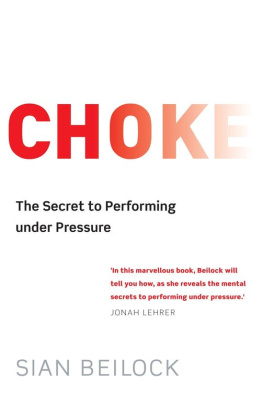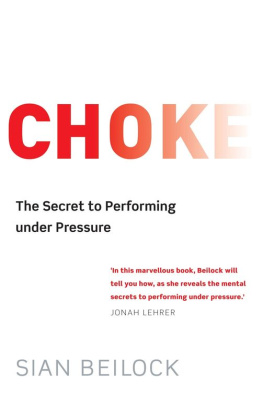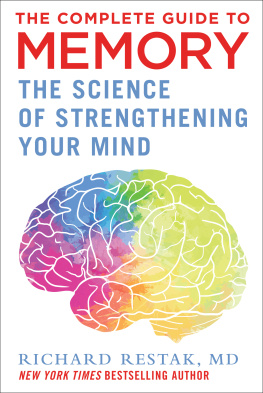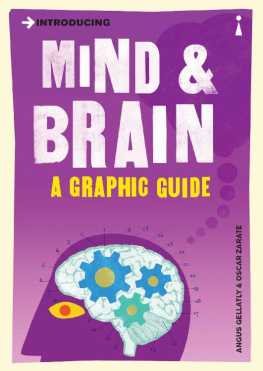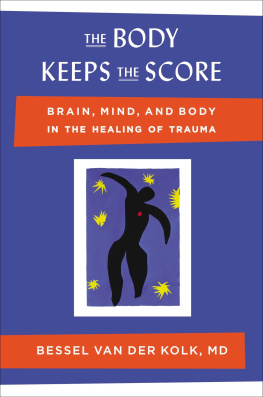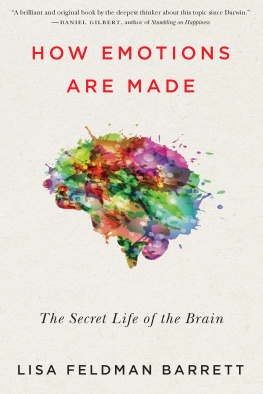To my grandmothers, Phyllis Beilock and Sylvia Elber, each of whom modelled a spark and drive in her lifes pursuits.
CONTENTS
CHAPTER ONE
The Curse of Expertise
CHAPTER TWO
Training Success
CHAPTER THREE
Less Can Be More
Why Flexing Your Prefrontal Cortex Is not Always Beneficial
CHAPTER FOUR
Brain Differences Between the Sexes
A Self-Fulfilling Prophecy?
CHAPTER FIVE
Bombing the Test
Why We Choke Under Pressure in the Classroom
CHAPTER SIX
The Choking Cure
CHAPTER SEVEN
Choking Under Pressure
From the Green to the Stage
CHAPTER EIGHT
Fixing the Cracks in Sport and Other Fields
Anti-Choke Techniques
CHAPTER NINE
Choking in the Business World
Ever since I was young I have been intrigued by amazing performances at the Olympics, in the orchestra pit, and even my friend Abbys performance on the LSAT (the law school assessment test). How do people go about turning it on when it counts the most? Why do some thrive while others falter when the stakes are high and everyone is focused on their every move? As we know, sometimes that one instance of performance one race, one test, one presentation can change an entire life or a career trajectory forever.
My friend Abby and I have known each other since we were both thrown in the same dorm room, freshman year at the University of California, San Diego. Although Abby and I shared a love for many things the ocean, the Grateful Dead, and sappy movies when it came to school, we couldnt have been more different. Throughout college I was constantly in the library studying for midterms and finals, writing papers, and rereading my notes from class. Abby was not. Now dont get me wrong, Abby did well in school, but you were more likely to find her at the beach than at the library and the likelihood that she would be daydreaming in class far outweighed the probability that she was actually listening to the professor lecturing in front of her. What amazed me most about Abby was her ability to perform well when the stakes were high. Abby wrote most of her English papers at four oclock in the morning the night before they were due and reliably got As on them, and those all-nighters in the library before finals always seemed to pay off for her.
After college, Abby decided to go to law school so she took the LSAT and received a near perfect score. Abby took several steps to prepare for the big testing day. She bought a test-prep book and learned all the tricks of multiple-choice testing and she took practice after practice test to try to improve her score. By the time the real test day arrived, Abby was scoring in the upper quartile of all LSAT test takers, but her practice scores were nowhere near what she was able to pull off in the actual exam. Abby turned it on when it counted the most and her high performance made all the difference. In part because of that one day, that one four-hour test, Abby was admitted to the top law school in the country, had a leading firm recruiting her by the end of her first year, and landed a high-paying job when she graduated a job that would never have been available to Abby if her performance on the LSAT had gone awry. One four-hour testing period, one-sixth of a day, changed Abbys life forever.
Psychologists are often accused of doing me-search, that is, trying to understand themselves rather than researching others, and, admittedly, this holds for me as well. As a child, and even into my adulthood, I performed well on the sports field and in the classroom , but in certain situations I didnt always attain the high-level performance I was striving for. I had one of the worst football games of my life playing in front of college recruiters and I could never manage to score as well on the actual SAT as I did on the many practice tests I took before the exam. Abby faced similar high-stakes situations, yet the pressures didnt seem to faze her. Instead she thrived under them.
By the time I got to college I was hooked on figuring out why folks sometimes fail to perform at their best when the stakes are highest. I majored in cognitive science and soaked up as much as I could about how the workings of the brain drive learning and performance. But I always felt as if I was only getting half the picture.
As fascinated as I was by research on how we acquire skills such as language and maths, I seldom came across people who were studying how the stresses of an important testing situation for example, sitting for the SAT or ACT might interfere with students ability to show what they are made of. Perhaps because I split my time in college between the lacrosse field and the classroom, I also wondered how my academic ability was linked to my athletic prowess. Was my nervousness before a final exam related to the pressures I felt to make the big play in the lacrosse finals? If you are the kind of person who tends to bomb big tests, does this mean that you have a high likelihood of missing the game-winning shot as well?
These issues have tantalized me since I started school, stepped onto the playing field, held a musical instrument in my hand for the first time, and watched Abby ace every test. Yet I couldnt begin to find the answers until I went off to graduate school at Michigan State University, which provided me with the opportunity to work with professors doing seminal work in sport science, psychology, and neuroscience. Everyone thought I was crazy to move from the San Diego beaches to the snow, but my MSU education was unique in that I was able to learn about how the brain supports success in diverse performance arenas. Regardless of whether I was studying the complex decision-making processes involved in flying an airplane or how different parts of the brain work together to do maths, my question about human performance was always the same: Why do we sometimes fail to perform at our best when it counts the most?
Early in my PhD career, I convinced one of my advisers, Dr Thomas Carr, to let me set up a putting green in his laboratory. We reasoned that if we could gain understanding into why golfers sometimes miss easy putts when there is a lot riding on their success, we might not only learn something about failure in sports, but we might also find out something interesting about why people make silly mistakes when taking a pressure-filled maths test. After all, both golf and maths are complex activities that take time and care to learn. And in fact we learned that, while poor performance under pressure was common in both tasks, their practitioners messed up their performances in different ways. To paraphrase Tolstoy, all unhappy performances resemble each other, but each is messed up in its own way.
Today, with the advent of new brain-imaging techniques , we can look inside the heads of players, students, and even people in the business world and make reasoned guesses about the types of programmes that the brain is running. We are also able to get a handle on why these internal programmes fail when people are under pressures that lead them to choke. In the past few decades, Ive found answers to some of my nagging questions about human performance. These answers will change how you think about learning, assessments of intelligence, and talent identification from the playing field to the classroom to the boardroom and beyond.
In Choke I present the latest information on what we psychologists know about how people learn and perform complex skills. I address questions that include: What are the brain systems that oversee how we pick up sports skills? Does the way we develop sports skills really differ from the ways we learn in the classroom or perform in the orchestra pit? How do we fluff performances in these different settings? Why do some people fail while others succeed when everything is riding on their next move and the pressure to excel is at a maximum?

